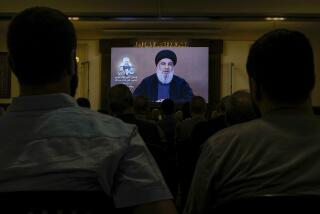Croatia Mobilizes as Serbian Sees ‘Total War’ Move
- Share via
BELGRADE, Yugoslavia — Despite a threatened European trade embargo, Yugoslavia’s warfare intensified Sunday after Croatia ordered full mobilization against the advancing federal army and a top Serbian general accused the republic of “asking for total war.”
Serbian guerrillas backed by federal army troops, tanks and aircraft fired shells within 10 miles of Zagreb as they closed in on the Croatian capital.
The Serbian forces also pressed their attack on the strategic city of Karlovac and reached the center of Vukovar, in eastern Croatia, one of the last Croatian strongholds in a region that has been pounded by artillery for weeks.
Naval gunboats continued blasting the besieged Croatian port of Zadar and fired near the medieval walled city of Dubrovnik, Croatian Radio reported.
Ferocious fighting has raged since the combatants--Serbia, Croatia and the Serbian-commanded federal army--assured European Community diplomats on Friday that they would halt all hostilities. But as with the six earlier EC-brokered accords, the latest truce has been ignored as the warring sides argue over its conditions.
Federal Defense Minister Veljko Kadijevic informed Croatian President Franjo Tudjman on Saturday that he interpreted the accord to mean Croatia must lift its blockade of federal bases before the army would observe a cease-fire. That prompted Tudjman to declare in a fiery overnight broadcast that the entire republic is being called to arms.
“The Greater Serbian imperialists and the bloodthirsty remnants of the Yugoslav Communist military crossed over to a general attack on Croatia, violating all international cease-fire agreements,” Tudjman said on state-run Croatian Radio. “This demands that we mobilize all our forces in a defensive war.”
Anyone possessing a firearm was asked to volunteer, and some Croatian officials speculated that the call-up would be made mandatory today.
At Mass in Zagreb’s Roman Catholic cathedral, priests began services by giving directions to the nearest bomb shelters in case of an air raid.
The city was gripped in tension as air raid sirens sounded twice Sunday afternoon. Some residents stood outside their homes with hunting rifles in hand, rather than taking cover in shelters.
From his sandbagged headquarters in Zagreb, a senior Serbian general warned that federal troops would step up their attacks on Croatia if the secessionist republic refused to heed the truce.
“If attacks on our barracks continue, we will continue our actions,” said Gen. Andrije Raseta, deputy commander of federal forces in Croatia. He added that with the mobilization call, “Tudjman is asking for total war.”
Amid indications that the conflict is escalating, European Community foreign ministers convened an emergency session at the De Haar castle in the Dutch town of Haarzuilen to pressure the republics to end the fighting.
The ministers issued a deadline of midnight tonight for all combatants to abide by the truce terms agreed to Friday, warning that the EC might impose an oil embargo or cut off trade with errant republics.
About 60% of Yugoslavia’s foreign trade is with the 12-nation EC. An oil embargo would quickly grind the war machines to a halt since strategic reserves are believed to have been depleted by the recent offensive. But threat of economic sanctions has done little so far to deter federal army aggression.
“We have to make the protagonists in this disaster realize that if by (tonight) people have not respected the agreement, the Community will take measures against those who do not fulfill the accord,” Spanish Foreign Minister Francisco Fernandez Ordonez said after the EC session.
The EC froze about $1 billion in aid to Yugoslavia when fighting broke out after Slovenia and Croatia declared independence June 25. But the EC has continued to abide by the preferential terms of its trade agreement with Yugoslavia.
Portuguese Foreign Minister Joao de Deus Pinheiro told reporters that the EC’s ultimatum was “ de facto recognition that Yugoslavia doesn’t exist anymore.”
The timing of the EC’s deadline for compliance with the latest truce coincides with expiration of another pact hammered out by the European diplomats on July 8.
Under terms of that accord, reached on the Adriatic island of Brioni, Slovenia and Croatia agreed to suspend secession moves for three months in return for an end to army assaults on their territory.
Croatia has lost one-third of its territory to Serbian rebels and the army since then, but Slovenia has effectively been granted its independence and is expected to seek recognition of its statehood as of midnight tonight.
Slovenia also plans to press for the timely departure of the last 3,000 Yugoslav troops from its territory.
Plans for withdrawing the remaining federal forces created a political storm in neighboring Italy.
Italian President Francesco Cossiga agreed to let Yugoslav troops pass through Italy as they leave Slovenia, bypassing Croatia and avoiding any chance of reinforcing the federal forces there.
Troops and tanks would pass through Trieste’s port and travel by sea to southern Montenegro, under the plan Cossiga agreed to late Friday at the EC’s request.
Thousands of Italians protested Sunday in Trieste, accusing the government of insensitivity. Trieste was under Yugoslav occupation at the end of World War II.
Serb rebels, with the help of the federal army, have fought fiercely to prevent Croatia’s secession. About 1,000 people have died.
Free-lance journalist Danica Kirka in Zagreb contributed to this story.
More to Read
Sign up for Essential California
The most important California stories and recommendations in your inbox every morning.
You may occasionally receive promotional content from the Los Angeles Times.














